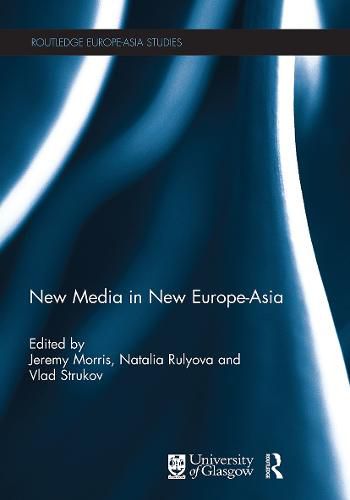Readings Newsletter
Become a Readings Member to make your shopping experience even easier.
Sign in or sign up for free!
You’re not far away from qualifying for FREE standard shipping within Australia
You’ve qualified for FREE standard shipping within Australia
The cart is loading…






This volume offers an in-depth investigation of the role of new media in the political, social and cultural life in the region of Europe-Asia. By focusing on new media, which is understood primarily as internet-enabled networked social practice, the book puts forward a political and cultural redefinition of the region which is determined by the recognition of the diversity of new media uses in the countries included in the study. This book focuses on the period prior to the advent of ‘world internet revolutions’, and it registers the region at its pivotal moment-at the time of its entry into the post-broadcast era. Does the Internet aid democratisation or it conditioned by socio-political norms? Has the Internet changed politics or has it had to fit existing political structures? Has the use of digital technologies revolutionized election campaigns? How is hyperlinked society different from society prior to the advent of the web? How do ordinary people actually use the Internet. These and other pressing questions - crucial to understanding the post-socialist world - are investigated in the current volume.
This book was published as a special issue of Europe-Asia Studies.
$9.00 standard shipping within Australia
FREE standard shipping within Australia for orders over $100.00
Express & International shipping calculated at checkout
This volume offers an in-depth investigation of the role of new media in the political, social and cultural life in the region of Europe-Asia. By focusing on new media, which is understood primarily as internet-enabled networked social practice, the book puts forward a political and cultural redefinition of the region which is determined by the recognition of the diversity of new media uses in the countries included in the study. This book focuses on the period prior to the advent of ‘world internet revolutions’, and it registers the region at its pivotal moment-at the time of its entry into the post-broadcast era. Does the Internet aid democratisation or it conditioned by socio-political norms? Has the Internet changed politics or has it had to fit existing political structures? Has the use of digital technologies revolutionized election campaigns? How is hyperlinked society different from society prior to the advent of the web? How do ordinary people actually use the Internet. These and other pressing questions - crucial to understanding the post-socialist world - are investigated in the current volume.
This book was published as a special issue of Europe-Asia Studies.